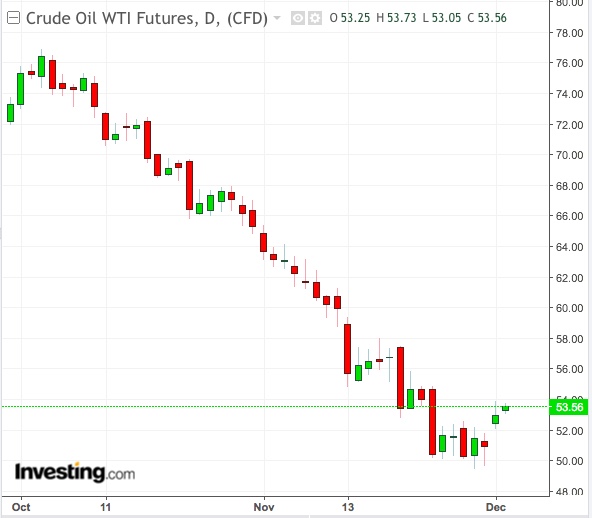US President Donald Trump’s actions with China at the G20 may have just strengthened Saudi Crown Prince Mohammed bin Salman’s resolve on what to do at this week’s OPEC meeting: “Kick the can down the road”, as analysts say, on oil production cuts.
MbS, as the Crown Prince is known by his initials, could borrow the president’s playbook on China trade negotiations by instructing Saudi Energy Minister Khalid al-Falih to stretch out over several months an “amenable” output cut that supports oil prices without letting them spike—an outcome that might be acceptable to Trump.
Said London-based Energy Aspects in a note to its clients:
“Saudi Arabia and its allies will cut output quietly, as they do not want a rerun of 2014's surge in inventories to record levels. The plan will be to keep the physical market in balance through high OSPs (Official Selling Prices), thereby lowering demand for Saudi oil. This would certainly help to put a floor under prices and gradually allow them to recover.”

Saudi Plan Could Be To 'Lie Low' At This OPEC Meeting
It added: “Riyadh could then re-evaluate OPEC policy and prepare the terrain for an extraordinary OPEC summit if needed” to carry out bigger cuts.
The Dec. 6-7 OPEC meeting in Vienna, therefore, could see the Saudis “lie low” and await the January change at the US Congress, where Democrats take over from Republicans who’ve been calling for sanctions against Riyadh for the murder of MbS’ critic, Saudi-born journalist Jamal Khashoggi, who had been residing in Washington.
While many analysts and the Saudis themselves thought the Kingdom could shake off the Khashoggi murder within days or weeks, the crisis has hounded MbS for two months now and keeps gaining strength as some Congressional Republicans demand the White House release of a CIA probe that allegedly details the Crown Prince ordering the killing.
Khashoggi Murder Not Going Away
Energy Aspects said Riyadh was, however, banking on the incoming Democrats in Congress to shift the House’s attention to “issues that are more likely to mobilize the electorate during the lengthy run-up to the 2020 presidential elections.”
It added:
“This is why the Saudi leadership seems to believe that they can ride out the storm and wait for the international outrage about the Khashoggi affair to fade, probably in a matter of months. In the meantime, MbS will pretend that his legitimacy remains untouched both domestically and internationally and will continue to attend major events.”
One of those events was last week’s G20 in Buenos Aires, where the Crown Prince, largely shunned by world leaders, huddled with Russian President Vladimir Putin to discuss strategies for the upcoming OPEC+ meeting that will include Moscow.
Trump, meanwhile, sat for dinner with China’s President Xi Jinping in the Argentine capital to find a fix to the growing tariffs battle between the two economic superpowers. In the end, the White House’s announcement of a 90-day truce in its trade war with Beijing bolstered crude prices more than the nuanced messages of “continued cooperation in oil market rebalancing” by the Saudis and Russians.
MbS Needs Trump’s Support On Multiple Fronts
While the kick-the-can-down-the-road approach with China could be an unintended Trump gift to MbS in managing this week’s OPEC, the young Saudi royal needs the US president’s support on multiple fronts, including the Saudi-led war in Yemen. A bipartisan group in the US Senate has voted for a bill seeking to end Washington’s military support for the Yemeni conflict and the main factions and regional powers involved will be in Sweden this week for UN-sponsored peace talks.
Energy Aspects expects the Crown Prince to concede just enough on Yemen and even the Qatar embargo to show some flexibility and regain lost political capital with commitment to policies Riyadh opposed previously. It adds:
“It remains to be seen whether MbS will manage to stick to this new script, but this seems to be the plan for now.”
But what will these plans do for oil prices?
Oil Could Struggle To Rally
After losing a third of their value from four-year highs in October, both US West Texas Intermediate and UK Brent crude settled up 4 percent on Monday, for their largest one-day gain in over four months.
For the rally to sustain, OPEC will need to make an emphatic production cut of 1.3 million barrels or more, analysts say.
Dominick Chirichella of the Energy Management Institute in New York said:
“The cut will have to be significant as the market must be convinced that inventories will quickly move back into a destocking pattern.”
OPEC’s Biggest Problem: Finding The Right Language For A Cut
Some like Goldman Sachs believe crude prices will not collapse even if there are no major reductions announced this week, saying expectations of belated OPEC action could still support the market. The Wall Street bank adds:
“We believe that the downside from current prices will remain moderate, potentially of up to $5 a barrel.”
But the most difficult thing for OPEC could be finding the right language to phrase its cut, says Energy Aspects, adding:
“Communicating it properly to this fragile market will be imperative—a jumbled statement referring to some broad intention to prevent the market from being oversupplied will undoubtedly trigger a further sell-off in prices.”
It adds:
“Despite widespread expectations of a 1-million-barrels-plus-per-day cut, the market must be ready for a no-deal scenario, at least in the way the market wants it communicated. Stealth cuts look most likely right now, which means it will take a few months for oil prices to climb back up again.”
